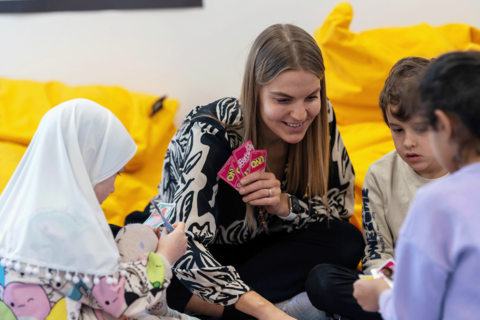Diversity as a strength

In the Opinmäen päiväkoti day care centre in Espoo, diversity and tolerance are part of everyday life. The 122 children who attend the day care centre speak 30 different languages as their mother tongue. The staff finds their work in a multilingual environment inspiring.
“A close-knit work community is a great strength. Shared successes and positive feedback boost the whole community. Supporting children’s language development is a key goal for us,” says Larissa Strodel-Paananen, director of the day care centre.
There are many international families living in the area. In addition to the clients, the Opinmäki staff is also diverse.
“We recognise and make use of different skills and educational backgrounds. Everyone can make the most of their own language and cultural skills. We have a positive and encouraging atmosphere, and we value each other,” says Strodel-Paananen.
Pinja Raijas and Serafina Taddeo work as early childhood education teachers at Opinmäen päiväkoti. They were aware of the day care centre’s good reputation before they started working there. They find working in an international community inspiring.
“We want to raise a new generation that accepts people’s diversity,” says Pinja Raijas. “Teaching language skills and supporting children’s development is our goal and our strength. Children are experts in their own language and culture. They, and their families, enrich our thinking too.”
When language is a barrier, pictures, expressions, gestures, and baby sign language are used at the day care centre. Serafina Taddeo works in pre-primary education. She thinks the most important thing is to recognise all the good in a child and to emphasise this in day-to-day life. It is rewarding to see how children’s language skills develop and they learn new things.
“The presence of the director and encounters between the children, parents and employees are important. It creates trust and openness,” says Larissa Strodel-Paananen.
The day care centre employees praise the City of Espoo for organising support measures, encouraging development and providing training opportunities. Employees are encouraged to improve their skills.
“We are happy to take interns,” says Strodel-Paananen. “They have new ideas and the latest knowledge. We hope they enjoy their experience and want to stay and work in Espoo.”
***
Internship improves professional self-confidence
Opinmäen päiväkoti is one of about 100 day care centres in the capital region that offer internships for students studying to become early childhood education teachers at the University of Helsinki.
“I appreciate the day care centre’s community-based approach to education and the guidance provided to students,” says University Lecturer Kati Sormunen. “Early childhood education is a collaborative effort. A good day care centre supports a child’s individual growth, regardless of their background and characteristics.”
At Opinmäki, activities are systematically planned so that they support a child’s mother tongue and Finnish skills. Sormunen and her colleague Jaakko Hilppö stress the importance of good internships for both students and universities.
“Internships are an essential part of the degree programme. They improve students’ professional self-confidence.”